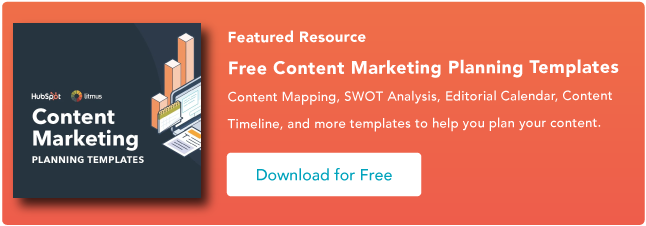It's the most wonderful time of the year for content marketers. This time of year is when you measure your impact on this year's company goals and uncover opportunities for moving the needle on next year's.
But when most people run these analyses and calculate next year's predictions, they forget about one crucial thing: market conditions. They're so focused on internal metrics and results that they miss out on some fascinating, high-level insights.
One way to analyze both internal and market conditions is through a content SWOT analysis. It provides a strategic view of the main opportunities and challenges that exist with content marketing in your market. The outcome of this analysis should be a high-level action plan containing the most important tasks that will impact the success of your content marketing.
In this post, I'll walk you through the basics of a content SWOT analysis and show you how you can use one in next year's planning process.
How to Do a Content SWOT Analysis
You can use our SWOT analysis template, or simply draw four boxes on a piece of paper, similar to the illustration below.
Then, you'll want to fill in each section accordingly:
Strengths
Here you will list 3-4 major internal strategic strengths of your current content marketing efforts. You need to identify what has been working well for you so far. (Even if you haven't started with content marketing yet, you can still complete this step.) In that case, for example, one of your strengths could be that you have expertise in a particular topic that your target audience is extremely interested in.
If you have started with content, however, some of your strengths could include a well-defined blogging strategy and established editorial calendar that continues to grow, or you could have really strong relationships with partners through which you can promote your content to generate additional traffic.
Weaknesses
Here you will list 3-4 major internal strategic weaknesses of your current content marketing efforts. Again, if you haven't started with content, you can still complete this step. For example, your weakness could be a lack of a dedicated resource to creating content.
If you have started with content, some examples of potential weaknesses would be an inability to track the ROI of your current content efforts. Or a weakness could be that your content focuses on one part of the funnel only, like lead generation, and you're lacking content to help close deals.
Opportunities
Here you will list 3-4 major external opportunities that exist for anyone working within your market. Some examples of opportunities might include that paid social distribution as it isn't as competitive as Adwords campaigns or generating leads from long-form 'how-to' content.
Threats
Here you will list 3-4 major external threats that exist for anyone working within your market. Some potential threats to your content marketing include creating content that is easily replicated by your competitors, like industry white papers for example, or your competitors might have more resources to develop a better resource centre, increasing their possibility to rank higher than you.

Once you have completed your SWOT analysis, you can then use that information to create an actionable plan. The actionable plan should be based upon the strengths and weaknesses you've identified from your current efforts, take advantage of opportunities in the market, and also account for potential threats to your strategy.
Below is an example of an action plan we have created based on the examples we mentioned above.

This analysis and action plan will give you a good idea of how you should start to analyze your content marketing strategies. If you would like more help with your content analysis and planning, HubSpot and Smart Insights have put together The Content Planning Template, which includes four templates and instructions on how to complete them for planning out a more effective content strategy for next year. Smart Insights provide Digital Marketing strategy advice for marketers including content marketing strategy - see their Content Marketing Strategy checklist hereto learn how to create a content strategy. As they say, if you're failing to plan, you're planning to fail -- so get planning now for a successful new year.












